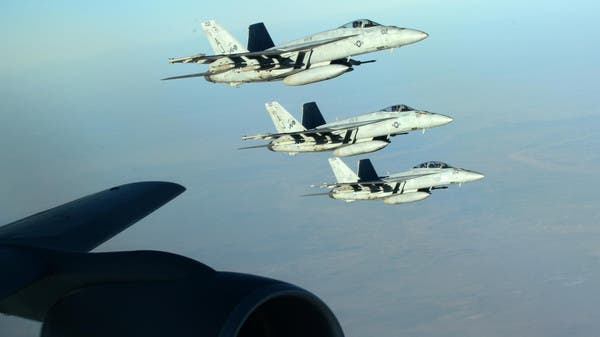By U.S. Army General Dempsey’s admission, Iran's proxy Shiite
militias make the overwhelming majority of the forces fighting ISIS in
the Iraqi town of Tikrit. Out of roughly 25,000 fighters, 20,000
of those, said Dempsey, are from militias funded and trained by Iran,
thus highlighting Tehran’s rising influence and dominance in neighboring
Iraq.
Tikrit, the birthplace of Saladin the founder of the
Ayyubid dynasty in the 12th century and of Iraq’s former dictator Saddam
Hussein, is witnessing another chapter in its history unfold. Shiite
militias with the Popular Mobilization Forces (Hashd Shaabi) along with
one Brigade from the Iraqi forces and a 1000-Sunni-tribal force are
poised to push militants from ISIS out of the town it had captured last
June.
Iran’s moment
Ever since ISIS took over Mosul
declaring its Caliphate last summer, Iran’s role and influence has
transformed in Iraq. Its “Dark Night” IRGC General Qassem Suleimani is
no longer in the shadows, but posing in battlefront photos assuring fighters from Shiite militias against ISIS, sipping tea, and embracing the elderly
in Iraq. Qassem Suleimani’s visibility brings home Iran’s new message:
its role and influence in Iraq will no longer be concealed and its
ambitious agenda in Sunni and U.S. areas alike is a reality for everyone
to reckon with.
Washington’s hands are tied politically and militarily in countering Iranian influence in Iraq
Joyce Karam
While the invasion in 2003 and the shortsighted policies by the
U.S. disbanding the Iraqi army and propping up the sectarian rule of
Nouri al-Maliki, opened the door for Iranian meddling and
militia-building in Iraq, ISIS has invited a more aggressive role for
Iran along the Euphrates.
“Iran has taken full advantage of the
collapse of the Iraqi army in Mosul” says Phillip Smyth, a researcher at
the University of Maryland and author of a policy paper on Shiite Jihad.
The rise of ISIS as an existential threat to Shiites whom it considers
heretics and apostates, drove many in that community to carry arms and
defend themselves while the Iraqi state continued to crumble. Grand
Ayatollah Ali Sistani’s Fatwa last summer “to defend the country, its
people, the honor of its citizens, and its sacred places” was exploited
to set the stage for the formation of the Popular Mobilization Forces,
made up of disciplined Shiite recruits and a much smaller component of
Sunni tribal and Kurdish forces.
Smyth sees Iranian influence in
funding, training and equipping Shiite militias at an all time high. He
estimates the number of Shiite militia fighters in Iraq today between
70,000 100,000, a volume that “is both astounding and strategic to the
way that Iran has constructed them.” The expert sees Iran as player
whose influence is only rising in Iraq, “they run ministries in Iraq
today with their own security apparatus.” This new dynamic was front and
center in appointing Mohammad Ghabban from the Iranian funded militia Badr as the new Iraqi interior minister.
U.S. concerned but constrained
In
his hearing yesterday, Dempsey voiced concern over the role of Shiite
militias in Tikrit battle and in Iraq at large. The U.S. army general
told the Senate Foreign Relations Committee: “We are all concerned about
what happens after the drums stop beating and ISIS is defeated, and
whether the government of Iraq will remain on a path to provide an
inclusive government for all of the various groups within it.”
Statements
of concern and policy reviews aside, Washington’s hands are tied
politically and militarily in countering Iranian influence in Iraq.
Smyth explains that the U.S. by eying a “light military footprint in
Iraq has set limits on its influence, and has little say of how and who
should fight ISIS on the ground.” While the Obama administration is
pursuing a parallel structure of Sunni trained “ National Guard” force
to take on ISIS, neither the Iraqi government nor these tribes who have
visited Washington recently promise a fast execution of such plan
anytime soon.
The U.S. increasingly finds its hands tied in Iraq, blindsided
by an Iranian-Iraqi offensive in Tikrit and a lame duck government in
Baghdad. In this context, the Tikrit battle will “greatly impede U.S.
strategy” says Smyth in potentially alienating more Sunnis, and blocking
a political path for an inclusive plan to fight ISIS. It was the
political marginalization of Sunni Iraqis after all from the beginning
of the Iraqi war in 2003 till today that set the stage for the notorious
al-Qaeda affiliated groups and then ISIS. Absent of a strategy that
addresses this Sunni marginalization and the political malignancy in
Iraq, the ISIS phenomenon will unlikely disappear.
For now,
Iran’s “Shadow Commander” Suleimani will relish in victorious moments in
Tikrit and beyond, only few miles from where his former arch-foe Saddam
Hussein is buried and with him the old order of Iraq.
____________________
Joyce
Karam is the Washington Correspondent for Al-Hayat Newspaper, an
International Arabic Daily based in London. She has covered American
politics extensively since 2004 with focus on U.S. policy towards the
Middle East. Prior to that, she worked as a Journalist in Lebanon,
covering the Post-war situation. Joyce holds a B.A. in Journalism and an
M.A. in International Peace and Conflict Resolution. Twitter:
@Joyce_Karam



